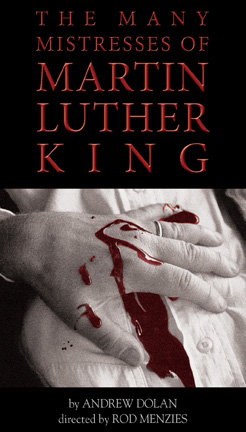WHAT IS AN AFRICAN AMERICAN?
While many plays purport to examine race issues, few tackle them head on. Ensemble Studio Theatre’s production of The Many Mistresses of Martin Luther King, by debut playwright Andrew Dolan, certainly does. It may not say anything new about race in America, but it does discuss race issues in a way that’s both fresh and refreshing. How so? As Dolan himself explains, “I wanted to write a play that is not necessarily a reflection of the liberal perspective, and I wanted to write it without apology.” Not only does Dolan not apologize, but his protagonist, white sociology professor Simon Case (played by Philip Casnoff), does not either. Case is incredibly opinionated, but his opinions on race, at least, are given grounding in his social work within a black Chicago neighborhood. What makes the expression of Case’s opinions refreshing is their utter reasonableness. On the one hand, there is not the smug political correctness of those who would forever apologize for slavery and a “separate but equal” society that they did not create. Nor is there the chip-on-the-shoulder blaming of whites for all the problems of blacks. On the other hand, neither is there the bigoted racism of those who would treat blacks as an inferior or subhuman species. With The Many Mistresses of Martin Luther King, Dolan expresses something rather different.
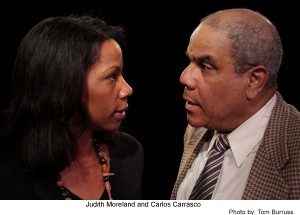 The play centers on Simon Case and his outspoken views. He is the only white character in an otherwise all-black cast. He has married a former student, Lashawna or Lash, for short (Tracey A. Leigh) and her troubled little brother Anquan (Theo Perkins) is living with them. To this trio is added the husband and wife professors Augustus, or Gus (Carlos Carrasco) and Janine (Judith Moreland). Four of the five characters teach at an unnamed university while the fifth, Anquan, is a student there and has been expelled for stealing an iPod. Besides the professional relationships between the two families, they have a more personal bond: the son and daughter of each are romantically entangled. Much of the play’s drama revolves around Simon’s progressive estrangement from his university and friends, which may or may not have something to do with his outspoken views on race. Dolan leaves plenty of ambiguity in the plot to allow for differing interpretations.
The play centers on Simon Case and his outspoken views. He is the only white character in an otherwise all-black cast. He has married a former student, Lashawna or Lash, for short (Tracey A. Leigh) and her troubled little brother Anquan (Theo Perkins) is living with them. To this trio is added the husband and wife professors Augustus, or Gus (Carlos Carrasco) and Janine (Judith Moreland). Four of the five characters teach at an unnamed university while the fifth, Anquan, is a student there and has been expelled for stealing an iPod. Besides the professional relationships between the two families, they have a more personal bond: the son and daughter of each are romantically entangled. Much of the play’s drama revolves around Simon’s progressive estrangement from his university and friends, which may or may not have something to do with his outspoken views on race. Dolan leaves plenty of ambiguity in the plot to allow for differing interpretations.
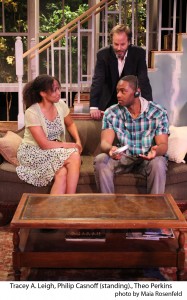 Both Simon Case and fellow professor Augustus give voice to sentiments that many of us have thought, but have either shied away from expressing or lacked the opportunity to do so. For example, Case takes to task young Anquan for talking about African-American this and African-American that. He challenges Anquan by rhetorically asking him if he’s ever been to Africa, if he can identify three African countries on a map – in short, if he knows anything about Africa at all. To call such a person an African-American is to use a misnomer.
Both Simon Case and fellow professor Augustus give voice to sentiments that many of us have thought, but have either shied away from expressing or lacked the opportunity to do so. For example, Case takes to task young Anquan for talking about African-American this and African-American that. He challenges Anquan by rhetorically asking him if he’s ever been to Africa, if he can identify three African countries on a map – in short, if he knows anything about Africa at all. To call such a person an African-American is to use a misnomer.
A perhaps more powerful statement is placed in the mouth of Augustus, and what makes it so authoritative is the fact that Augustus speaks it: he recounts how his father was born a nigger, became a negro, a colored person, a person of color and, finally, a black man. The constant changing of what one calls a black man and what he desires himself to be called can be incredibly frustrating. What makes Dolan’s play especially challenging is Case’s revelation near the end of the story. Without giving it away, one can only say that Dolan has taken the issue of race and turned it on its head in a magnificent reductio ad absurdum.
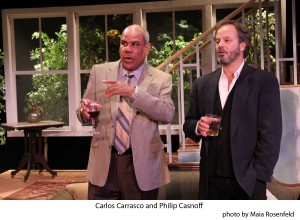 Despite its iconoclastic title, The Many Mistresses of Martin Luther King isn’t really about King at all. The title is taken, rather, from an historical novel that Case begins writing once he loses his position at the university. His novel is based on the supposed fact, which has not been proven, that King slept with three different women on the night before his assassination. Case’s novel about King, then, is told through the imagined voices of those three women. Of course, saying these things aloud, like much else that Case says, inflames many people to anger, who do not wish to see King’s pristine reputation tarnished. Dolan’s title, then, is a rather flimsy premise for a play, but it works surprisingly well.
Despite its iconoclastic title, The Many Mistresses of Martin Luther King isn’t really about King at all. The title is taken, rather, from an historical novel that Case begins writing once he loses his position at the university. His novel is based on the supposed fact, which has not been proven, that King slept with three different women on the night before his assassination. Case’s novel about King, then, is told through the imagined voices of those three women. Of course, saying these things aloud, like much else that Case says, inflames many people to anger, who do not wish to see King’s pristine reputation tarnished. Dolan’s title, then, is a rather flimsy premise for a play, but it works surprisingly well.
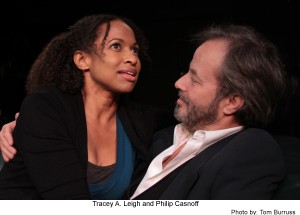 All five actors have done an excellent job getting into their respective roles. Theo Perkins perfectly imitates the speech patterns and saggy pants of many young black men of his generation. The other four are utterly convincing as academics, which may come naturally to some of the actors who are or have been university lecturers – even down to their clothes. Philip Casnoff has grown the requisite beard and wears cardigan sweaters. The only thing that seemed a bit unnatural was the kisses shared by Casnoff and Leigh. It’s not their pairing and mutual attraction that is unbelievable, but the abrupt manner of their kisses, which seem forced and almost violent.
All five actors have done an excellent job getting into their respective roles. Theo Perkins perfectly imitates the speech patterns and saggy pants of many young black men of his generation. The other four are utterly convincing as academics, which may come naturally to some of the actors who are or have been university lecturers – even down to their clothes. Philip Casnoff has grown the requisite beard and wears cardigan sweaters. The only thing that seemed a bit unnatural was the kisses shared by Casnoff and Leigh. It’s not their pairing and mutual attraction that is unbelievable, but the abrupt manner of their kisses, which seem forced and almost violent.
Speaking of abrupt, one thing that is puzzling at first is Dolan’s quick scene changes. The play’s action does not move inexorably forward, but backward and forward and back again. Another interesting device he uses is the lecture. The script opens with Janine lecturing on the use of the chorus in classical Greek drama as a way of commenting on the play the audience is about to see. All four academic characters lecture at various points throughout the play, using a lectern standing in one corner of the set. Scenic designer Tom Buderwitz has created a beautiful, realistic and suitably versatile set, most of which is Simon Case’s living room.
The Many Mistresses of Martin Luther King is full of humor, wit and pathos. Ensemble Studio Theatre under the direction of Gates McFadden has done an excellent job bringing this world premiere to life. Andrew Dolan deserves kudos for tackling such a fraught subject in his debut play. Yet, perhaps Dolan’s play would be perceived as less provocative if its central, outspoken character was black rather than white. Similarly, the fact that Dolan himself is white also makes the play provocative. The presence of a white playwright and a white protagonist, however, do much for the play’s appeal, drawing in white audiences as well as black. And this is one of the keys to Dolan’s success: that he manages to write about race in a way that can be appreciated by both blacks and whites. One gets the impression that Dolan’s characters are weary of race issues – and that they would rather just forget all about them and move on.
photos by Maia Rosenfeld and Tom Burruss
The Many Mistresses of Martin Luther King
Ensemble Studio Theatre at Atwater Village Theatre in Glendale (Los Angeles Theater)
scheduled to end on April 29
for tickets, visit http://www.ensemblestudiotheatrela.org
